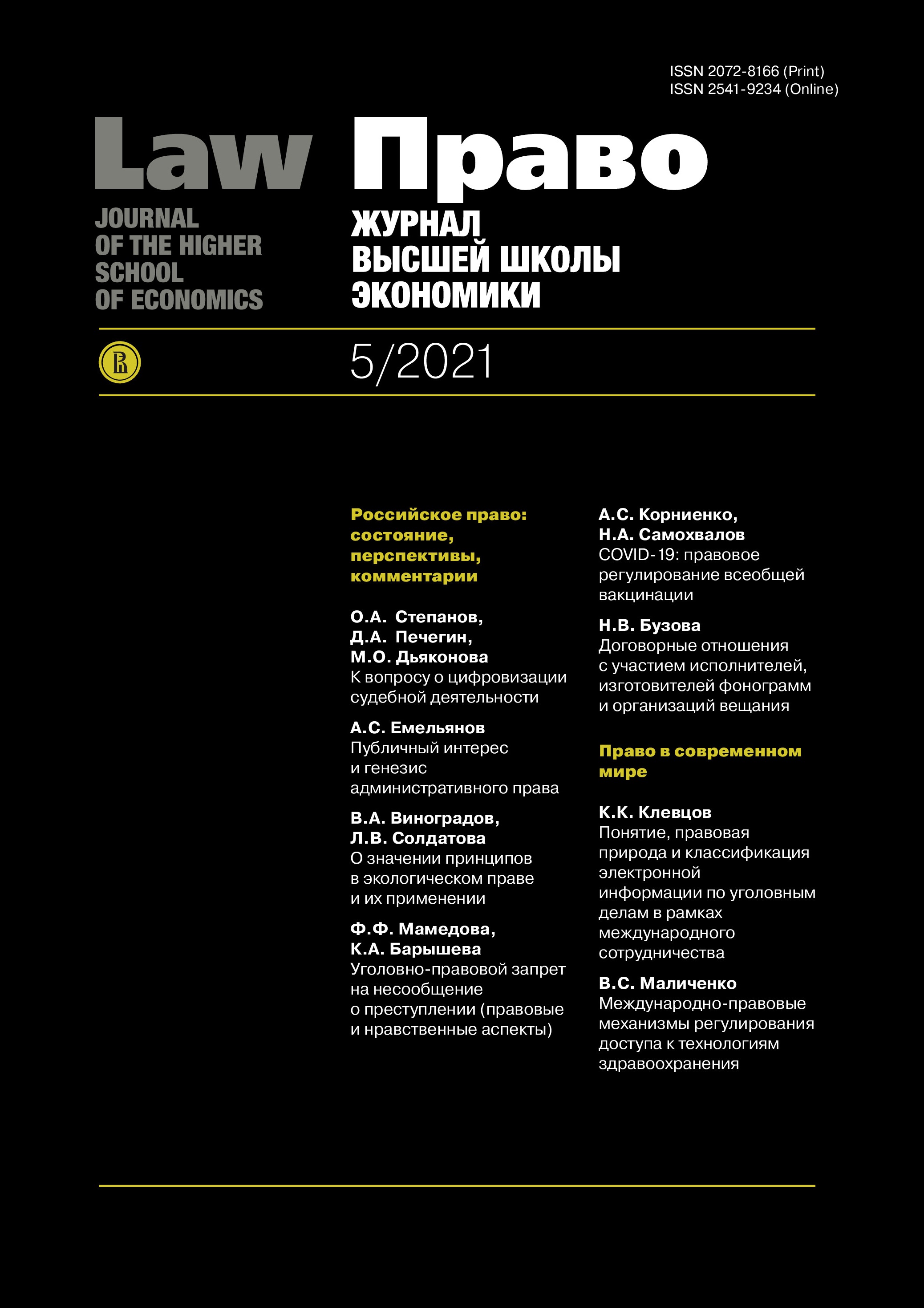Ideology of Constitutional Amendments of 2020 in the Sphere of Social and Economic Development
Abstract
The article explores the content of the concepts: “ideology”, “ideological function of the Constitution”, “constitutional values”, “traditions”. The author notes that ideology in the Constitution is expressed in the regulatory potential of its ideological function, and is also reflected in the constitutional text in the form of values, ideological guidelines, a certain political and legal philosophy of the structure of the state and society. Constitutional values can be regarded as universally valid, universal guidelines, and can be interpreted taking into account constitutional identity, national feature. One of the properties of constitutional values is their traditionality. Tradition as a stable concept or paradigm of the development of the state and society determines the scope and content of constitutional values, sets the meaning of the content of the constitutional text. The 2020 constitutional amendments in the sphere of social and economic development saturate the ideological basis of the structure of the state and society, they show ideological guidelines for current legal regulation and law enforcement. When interpreting the provisions on maintaining civil peace and harmony, guaranteeing mutual trust between the state and society, forming social justice and partnership, ensuring economic, political and social solidarity, creating conditions for sustainable economic growth, improving the welfare of citizens, and respecting the human labor, the author focused on the indication in the Constitution of the Russian Federation itself on adherence to traditions and preserving the memory of ancestors. The article concludes that the complete denial of the ideas of the Soviet socialist system and their rejection by the Constitution of the Russian Federation in 1993 could not but lead after a certain time to the desire to return to the ideological meanings of some legal institutions and categories, the importance of which for the future development of the state and society, obviously, was underestimated at the initial stage in post-Soviet Russia. When using socio-political, grammatical and historical-political interpretation of norms, the article presents modern interpretations of constitutional provisions on the social and economic development of the state and society, taking into account the Soviet tradition.
References
Avakian S.A. (1997) The Constitution of Russia: nature, evolution, modernity. Moscow: Russian Juridical House, 512 p. (In Russ.).
Aranovsky K.V. (2003) Constitutional tradition in the Russian environment. Saint Petersburg: Law Center Press, 658 p. (In Russ.).
Bondar N.S. (2006) Constitutionalization of socio-economic development of the Russian statehood (in the context of the Constitutional Court decisions). Moscow: Vikor-Media, 224 p. (In Russ.).
Bondar N.S. (2017) Economic constitutionalism of Russia: essays, theories and practices. Moscow: Norma, 272 p. (In Russ.).
Jackson V.C. (2010) Paradigms of public law: transnational constitutional values and democratic challenges. International Journal of Constitutional Law, no. 3, pp. 517-562. Available at: https://academic.oup.com/icon/article/8/3/517/623509 (accessed: 15.11.2021)
Jacobson G.J. (2012) Constitutional values and principles. Oxford Handbook of Comparative Constitutional Law. Available at: https://www.oxfordhandbooks.com/view/10.1093/oxfordhb/9780199578610.001.0001/oxfordhb-9780199578610-e-38 (accessed: 15.11.2021)
Kravets I.A. (2002) Forming Russian constitutionalism. Novosibirsk: Yukea, 360 p. (In Russ.).
Kutafin O.E. (2008) Russian constitutionalism. Moscow: Norma, 544 p. (In Russ.).
Mazaev V.D. (2021) The search for new meanings continues (according to the amendments to the Constitution). Lex Russica, no. 7, pp. 15-32. (In Russ.).
Pigolkin A.S. (2005) Interpretation of normative acts in the USSR. Moscow: Justicinform, 144 p.
Přibáň J. (2019) Constitutional values as normalization of societal power: from a moral transvaluation to a systemic self-valuation. The Hague Journal of the Rule of Law, vol. 11, pp. 451-459.
Shaio A. (2001) Self-restraint of power: short course of constitutionalism. Moscow: Jurist, 292 p. (In Russ.).
Skurko E.V. (2008) Principles of law. Moscow: Os-89, 192 p. (In Russ.).
Starostenko K.V. (2008) Constitutional and political diversity: essence and implementation in Russia. Saint Petersburg: Law Center Press, 293 p. (In Russ.).
Vitruk N.V. (2009) Fidelity to the Constitution. Moscow: RAP, 272 p. (In Russ.).
Copyright (c) 2021 Law Journal of the Higher School of Economics

This work is licensed under a Creative Commons Attribution-ShareAlike 4.0 International License.


















